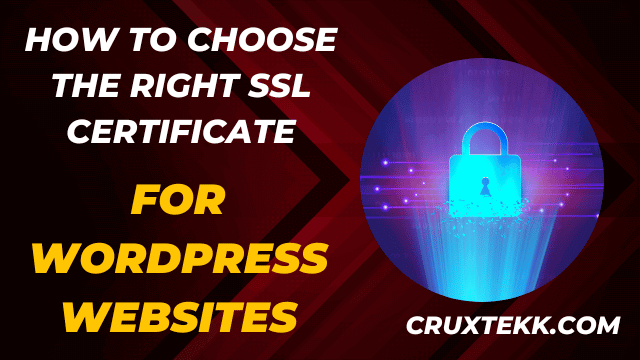Securing your WordPress website is of paramount importance to protect both your site and the data of your visitors. One essential element of website security is an SSL (Secure Sockets Layer) certificate, which encrypts data transmitted between your site and users. Choosing the right SSL certificate for your WordPress website is crucial. In this article, we’ll guide you through the steps to make the right choice.
Understand the Types of SSL Certificates
There are different types of SSL certificates available, and understanding the distinctions among them is the first step in making an informed decision. The major types are:
- Domain Validation (DV) Certificates: These certificates are the most basic and are typically the most affordable. They only verify the ownership of the domain, making them suitable for personal blogs or small websites.
- Organization Validation (OV) Certificates: OV certificates offer a higher level of validation. In addition to domain ownership, they verify the legitimacy of the organization. They are often used for business websites.
- Extended Validation (EV) Certificates: EV certificates are the most rigorous and secure option. They include a thorough validation process, displaying a green address bar in browsers, signifying the highest level of trust. EV certificates are ideal for e-commerce and financial websites.
- Wildcard Certificates: These certificates secure the main domain and all of its subdomains. If you have multiple subdomains under your WordPress website, a wildcard certificate can save time and effort.
- Multi-Domain (SAN) Certificates: Multi-domain certificates can secure multiple domains and subdomains with a single certificate. This is beneficial if you manage multiple WordPress websites.
Consider the Certificate Authority (CA)
The Certificate Authority is the entity that issues the SSL certificate. It’s crucial to choose a reputable CA with a track record of trust and reliability. Some well-known CAs include DigiCert, Comodo (now Sectigo), GlobalSign, and Let’s Encrypt (which offers free certificates).
Evaluate the Compatibility
Ensure that the SSL certificate you choose is compatible with the WordPress hosting platform you use. Most popular hosting providers are compatible with a wide range of SSL certificates, but it’s still wise to double-check.
Check for Warranty and Support
Review the SSL certificate’s warranty and support options. Some SSL certificates come with warranties that cover potential damages caused by a breach. Additionally, assess the support provided by the CA in case you encounter issues or need assistance with the certificate.
Determine the Validation Level
The level of validation required depends on the nature of your WordPress website. For a personal blog, a DV certificate may suffice, but for an e-commerce website, consider an EV certificate for the highest level of trust.
Assess the Cost
SSL certificates vary in cost, with DV certificates typically being the most affordable and EV certificates being the most expensive. Consider your budget and the security needs of your website when making your choice.
Research Renewal Procedures
Find out how often your SSL certificate needs to be renewed. Most SSL certificates have a validity period of one to two years. Set up a reminder to renew your certificate before it expires to avoid any disruptions in security.
Installation and Setup
Consider how easy it is to install and set up the SSL certificate. Most hosting providers offer straightforward processes for adding SSL to your website. Some even provide automatic SSL installation.
Test Your SSL Certificate
After installation, it’s crucial to test your SSL certificate to ensure that it’s working correctly. Use online tools to check for proper configuration and encryption.
Conclusion
Choosing the right SSL certificate for your WordPress website is essential for security, user trust, and SEO. Evaluate your website’s needs, budget, and the level of validation required to make an informed decision. With the right SSL certificate in place, you can provide a safe and secure online experience for your visitors.



